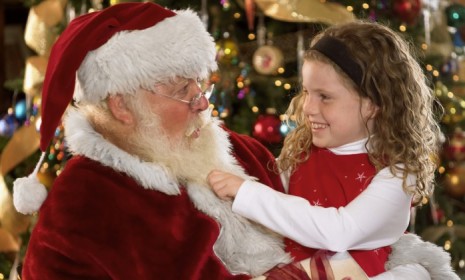Telling your kids that Santa doesn't exist
The day comes when every child asks whether Santa Claus is real. How should a parent respond?

A free daily email with the biggest news stories of the day – and the best features from TheWeek.com
You are now subscribed
Your newsletter sign-up was successful
It's the question every parent dreads: Is Santa Claus real? The bombshell can drop at age 6, or 7, or 8, even older, but no matter what the child's age, it can "mark the end of a certain kind of innocence for the child," says Marie Hartwell-Walker in Psych Central, "and an end of a fun chapter of parenting for the adults." How parents respond can determine whether the moment results in tears, anger, or a "sweet transition" to "a new kind of magic." When the question comes, what's the best way to answer it?
Lie through your teeth: If your kids are still young enough to buy it, tell them Santa is real, says Margot Magowan in the San Francisco Chronicle. "I tell them how Santa can fold his body up, like a magical yogi, to wiggle down our chimney." The little ones "look adorable sucking it all up, mouths open, eyes wide." When "these childhood myths" fade away, it will be "a gentle way for kids to learn [that] well-intended parents are not always reliable sources of truth."
The Week
Escape your echo chamber. Get the facts behind the news, plus analysis from multiple perspectives.

Sign up for The Week's Free Newsletters
From our morning news briefing to a weekly Good News Newsletter, get the best of The Week delivered directly to your inbox.
From our morning news briefing to a weekly Good News Newsletter, get the best of The Week delivered directly to your inbox.
Fess up. Teach them about the real Christmas: We tell our kids the truth, says Pastor Marc Driscoll in The Washington Post. That means teaching them about the real Saint Nick — "a wonderful man who loved and served Jesus faithfully" — and about the myth of Santa Claus. We don't "demonize" Santa, but we don't lie to convince our children he's real. "Our kids thank us for being both honest and fun, which we think is what Jesus wants."
"What we tell our kids about Santa"
Tell the truth when they're ready to hear it: I'm no "Santa fan," says Lissa Rankin in Care2, but I'm not about to tell my daughter "Santa is a figment of Hallmark's imagination." She'll figure it out, and if she gets wise before her peers, I'll tell her it's OK to keep the "secret" to avoid spoiling their fun. Santa Claus brings children joy, so I won't be teaching her to lie. I'll be teaching her about "compassion."
"Is Santa real? What to tell the kids"
A free daily email with the biggest news stories of the day – and the best features from TheWeek.com
Follow the child's lead: Doubt creeps in naturally as your child gets older, says Doreen Nagle in the Chicago Sun-Times. By age 9 or sooner, "the logical brain kicks in," and all bets are off. At any age, it's best to kick back the question, and ask, "what do you think?" You'll know by the response whether your little one is ready to let go of Santa. But "don’t push. You can do an emotional disservice if you push a child into cold hard realities before he or she is ready."
-
 Film reviews: ‘Send Help’ and ‘Private Life’
Film reviews: ‘Send Help’ and ‘Private Life’Feature An office doormat is stranded alone with her awful boss and a frazzled therapist turns amateur murder investigator
-
 Movies to watch in February
Movies to watch in Februarythe week recommends Time travelers, multiverse hoppers and an Iraqi parable highlight this month’s offerings during the depths of winter
-
 ICE’s facial scanning is the tip of the surveillance iceberg
ICE’s facial scanning is the tip of the surveillance icebergIN THE SPOTLIGHT Federal troops are increasingly turning to high-tech tracking tools that push the boundaries of personal privacy